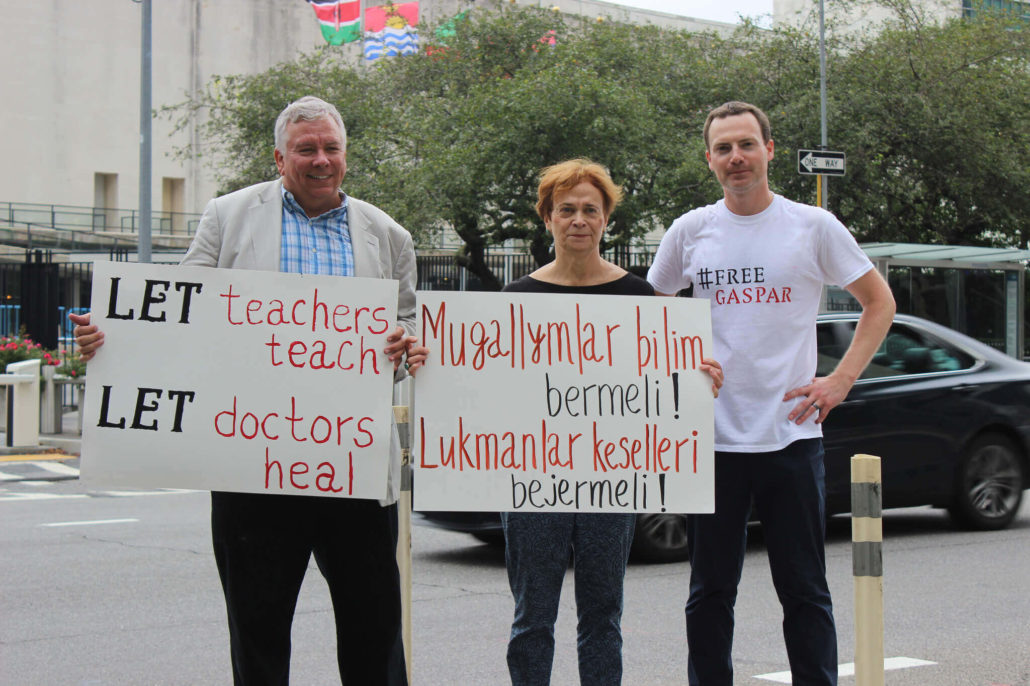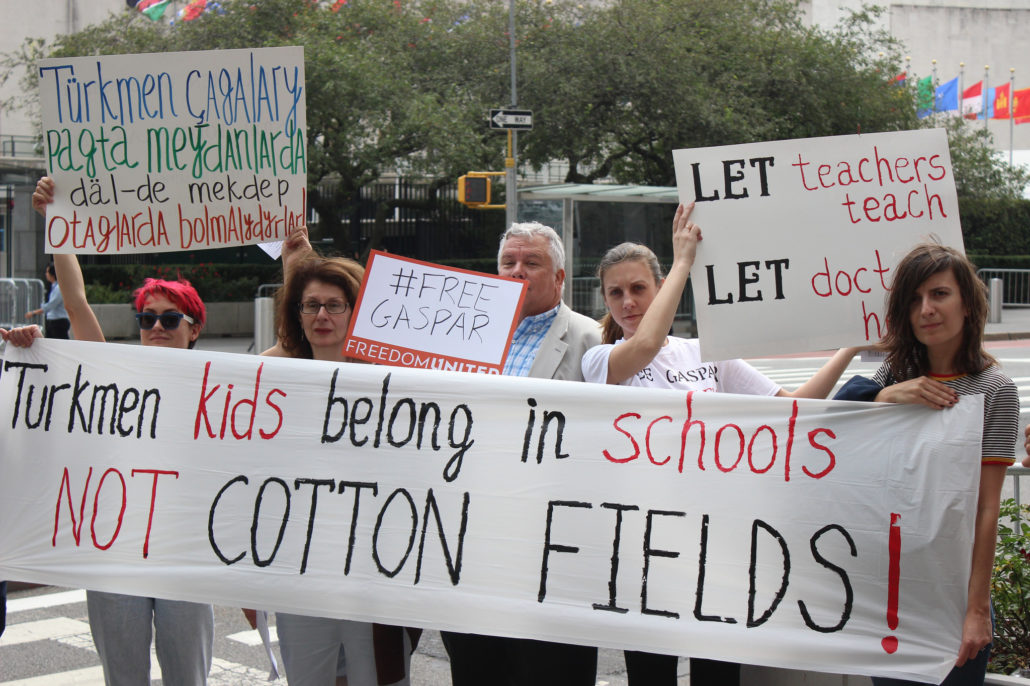Child labor, Forced Labor, and Cotton and How They All Converged at the UN October 1st

CLC’s Reid Maki (on the left) joins Turkman Cotton protestors, including the Cotton Campaign’s, Kirill Boychenko (right).
Consumers love cotton. It’s soft, comfortable and natural. But cotton has a dark side: child labor and forced labor is often used to produce it.
Eighteen countries use child labor to produce cotton and nine use forced labor. Eight countries use both child labor and forced labor in its production. These numbers make cotton an unusually exploitative crop, spreading human misery.
Through its membership in the Cotton Campaign, the National Consumers League (NCL) and the Child Labor Coalition (CLC), which NCL co-chairs, have fought for many years to reduce child labor and forced labor in cotton from Uzbekistan—a top eight producer of the crop. The country’s ruling elites compelled school children, teachers, and civil servants to go out into the fields and harvest the crop for six or more weeks each year with little pay.
Over the last decade, the Cotton Campaign has been remarkably successful, bringing about an end to systematic child labor in Uzbek cotton fields and allowing children to focus on their education. “It’s one of the most important and dramatic successes of the last decade when it comes to reducing child labor,” said Sally Greenberg, the chair of the CLC.
The Cotton Campaign continues to work on reducing forced labor in Uzbekistan but has also recently decided to expand the campaign to reduce both child labor and forced labor in Turkmenistan, which neighbors Uzbekistan.

The protest lasted for about two hours and organizers felt sure that it got the attention of the Turkman government.
Like Uzbekistan, Turkmenistan is led by an autocrat—a dictator named Gurbanguly Berdimuhamedov, who, when he’s not ruling Turkmenistan with an iron fist, performs as a DJ and has made rap videos with his grandson. Sounds like a fun guy, right? Sadly, Berdimuhamedov’s 12-year tenure as president has seen a wide array of alarming human rights abuses and forcing children and adults to harvest cotton is part of a package of his egregious mistreatment of Turkmen citizens.
The Cotton Campaign is hoping that the tactics used to dramatically reduce child labor in Uzbekistan will work in Turkmenistan too. Those techniques include widespread clothing company pressure: well over 100 apparel companies pledged not to buy Uzbekistan cotton.
Already, 12 companies have pledged not to purchase Turkmen cotton, and US Customs stopped a shipment of Turkmen cotton from entering the U.S. last spring over concerns that labor abuses in their production violated U.S. trade laws.
It’s hard to get dictators to do the right thing and the Cotton Campaign has often resorted to protests to help attract their attention and the attention of others. On October 1st, NCL’s director of child labor advocacy Reid Maki, a veteran of many Cotton Campaign protests, traveled to the United Nations in Manhattan to join the campaign’s protest against the Turkman president, who was there to participate in the UN General Assembly. Twenty other participants joined the protest outside UN headquarters, chanting against child labor and holding signs that urged Turkmenistan to end labor abuses.
“I’m pretty sure we got their attention,” said Maki, who also coordinates the CLC for NCL. “A black SUV limo pulled up with plates that said, ‘Tyrkman’ – we figured it was from the Embassy of Turkmenistan and we tried to give it one of our leaflets, but it sped off when we approached.”
The protestors were also asking for the release of incarcerated journalist Gaspar Matalaev, who had reported on forced labor and child labor in Turkmenistan and has spent the last two years in jail because of it. The Cotton Campaign has helped collect over 85,000 petition signatures to free Gaspar.
Although small, the protest was deemed a success by participants. “A rare appearance by the Turkmen president at the UN afforded a great opportunity to embarrass the regime,” said Maki. “We look forward to the day when Gaspar Matalaev is released and Turkmen children and adults are no longer forced to work in cotton fields.”



